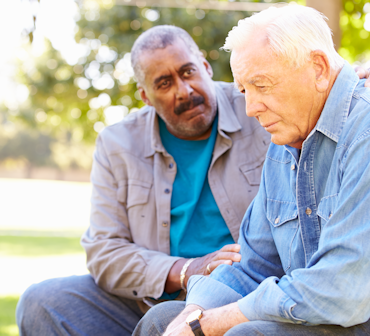
What is Grief?
Grief is a strong, sometimes overwhelming emotion for people, regardless of whether their sadness stems from the loss of a loved one or from a terminal diagnosis they or someone they love have received.
They might find themselves feeling numb and removed from daily life, unable to carry on with regular duties while saddled with their sense of loss.
Grief is the natural reaction to loss. Grief is both a universal and a personal experience. Individual experiences of grief vary and are influenced by the nature of the loss. Some examples of loss include the death of a loved one, the ending of an important relationship, job loss, loss through theft or the loss of independence through disability.
Mourning can last for months or years. Generally, pain is tempered as time passes and as the bereaved adapts to life without a loved one, to the news of a terminal diagnosis or to the realization that someone they love may die.

A Friend is There
If you have a friend who is grieving, you will want to be their shining star. Grief is awkward and difficult; it’s something we tend to shy away from if we can help it. If you have never experienced grief, you may be at a loss to know what to say or do. You Don’t Need to Say the Right Thing. In fact, you don’t need to say anything at all. You just need to be there. It may not feel like much, but your physical presence alone is a comfort—a hug, a hand to squeeze, a presence in the room. Remember that you can’t fix this; all you can do is open your arms and open your heart. The discomfort and awkwardness outsiders often feel toward grief has given rise to many platitudes over the years. Steer clear from saying, “Everything happens for a reason,” or, “It is God’s will.” Even someone with the strongest faith will find that hard to swallow. Try to remember anniversaries such as the birthday of the person who died and the anniversary of the date of their death. Sending a card or even just a text on the day will let your friend know that you are remembering too. Celebrating the life of the person your friend has lost can be as simple as reminiscing and talking about them. You could ask to look at photos and other mementos with your friend or help put together a life book. Don’t be afraid to mention the person they lost. Memories are all that remain after a loss, and talking about the person who died really does help to keep them alive.

Express Your Feelings
Bereaved people need to express their emotions. You can encourage them by saying , "What are you feeling?"..."Tell me what's happening with you"..."It must be hard for you". Don't use clichés. Unfortunately, the survivors may feel even more alone and misunderstood when clichés are offered. Instead, let them tell you the emotions they are experiencing.
Focus on where they are. Accept their moods whether it be fear or rage or panic. You are not there to judge. Remember, the survivors may need to talk about their loved ones for months and years-not just a few days following the funeral. Healing is a long, long process. Feelings and attitudes change. Just because the survivors may refuse to talk one day doesn't mean they don't need to communicate the following day.
Friends must be sensitive to the shifting of moods and feelings.
Love understands love; it needs no words.

It's Okay To Cry
Friends, as well as the bereaved, may need the opportunity to acknowledge their loss. Crying is a means by which people acknowledge the death of a loved one and work their way out of despair. Tears are not evidence of weakness. Weeping can be a shared experience.
Tears are your body’s release valve for stress, sadness, grief, anxiety, and frustration. Also, you can have tears of joy, say when a child is born or tears of relief when a difficulty has passed. It feels cleansing, a way to purge pent up emotions so they don’t lodge in your body as stress symptoms such as fatigue or pain. For both men and women, tears are a sign of courage, strength, and authenticity.
Shedding tears can be a huge and very healthy emotional release, particularly if you are experiencing deep pain, sadness, anger, or stress. One study analyzed 140 years of popular articles about crying and found that more than 9 in 10 found tears to be agood way to release pent-up feelings.

Don't Be Afraid To Touch
When words are sometimes meaningless, touching can be a most comforting way of communication. A squeeze of the hand or an embrace can eloquently tell them how much you care.
- * Inspire positive thinking and expand trust. Known as the "feel good" hormone, oxytocin helps inspire positive thinking and maintaining an optimistic outlook on the world.
* Reduce social anxiety and stress.
*Boost immune system and lower blood pressure.
I bet you never knew how good it felt to get a reassuring hug or squeeze, but never given much thought to how your body interpreted the sensation. "A hug, pat on the back, and even a friendly handshake are processed by the reward center in the central nervous system, which is why they can have a powerful impact on the human psyche, making us feel happiness and joy," explains neurologist Shekar Raman, MD, based in Richmond, Virginia. "And it doesn't matter if you're the toucher or touchee. The more you connect with others—on even the smallest physical level—the happier you'll be."

Continue to Call and Visit
You could ask your bereaved friends, "Can I help?"..."Do you need anything?". Not wanting to intrude they may answer "No" even though their refrigerator is empty and they leave their house only to go to work. Don't ask...Do! Telephone. Visit. Drop by with food. Take the children on outings. Invite the family to your home. Demonstrate that you care, that you have not forgotten them.
The closer your relationship to the bereaved or the person who died, the sooner you'll want to reach out. If you are a close friend or relative: Call or text immediately, find a time to visit the bereaved at home, and continue to stay in touch on a daily basis. If you are a casual friend or extended friend: Send an email or text immediately and follow up after the funeral. If you are a colleague or acquaintance: Send an email or handwritten note immediately. If you are a friend of a friend: Send an email or handwritten note at your convenience.
That is what love and friendship are all about!

